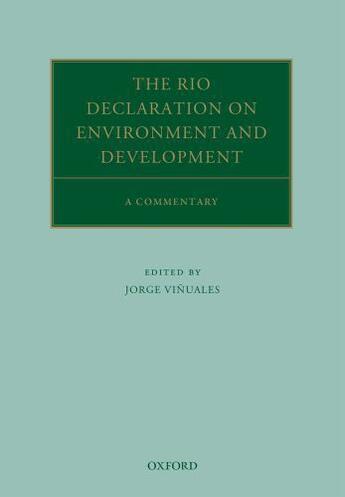Des idées de lecture pour ce début d'année !
Passionné(e) de lecture ? Inscrivez-vous
gratuitement ou connectez-vous pour rejoindre la
communauté et bénéficier de toutes les fonctionnalités du site !

The international community has long grappled with the issue of safeguarding the environment and encouraging sustainable development, often with little result. The 1992 Rio Declaration on Environment and Development was an emphatic attempt to address this issue, setting down 27 key principles for the international community to follow. These principles define the rights of people to sustainable development, and the responsibilities of states to safeguard the common environment. The Rio Declaration established that long term economic progress required a connection to environmental protection. It was designed as an authoritative and comprehensive statement of the principles of sustainable development law, an instrument to take stock of the past international and domestic practice, a guide for the design of new multilateral environmental regimes, and as a reference for litigation.
This commentary provides an authoritative and comprehensive overview of the principles of the Declaration, written by over twenty inter-disciplinary contributors, including both leading practitioners and academics. Each principle is analysed in light of its origins and rationale. The book investigates each principle's travaux préparatoires setting out the main points of controversy and the position of different countries or groups. It analyses the scope and dimensions of each principle, providing an in-depth understanding of its legal effects, including whether it can be relied before a domestic or international court. It also assesses the impact of the principles on subsequent soft law and treaty development, as well as domestic and international jurisprudence. The authors demonstrate the ways in which the principles interact with each other, and finally provide a detailed analysis of the shortcomings and future potential of each principle. This book will be of vital importance to practitioners, scholars, and students of international environomental law and sustainable development.
Il n'y a pas encore de discussion sur ce livre
Soyez le premier à en lancer une !

Des idées de lecture pour ce début d'année !

Si certaines sont impressionnantes et effrayantes, d'autres sont drôles et rassurantes !

A gagner : la BD jeunesse adaptée du classique de Mary Shelley !

Caraïbes, 1492. "Ce sont ceux qui ont posé le pied sur ces terres qui ont amené la barbarie, la torture, la cruauté, la destruction des lieux, la mort..."